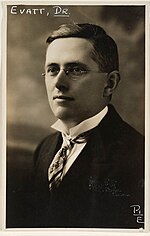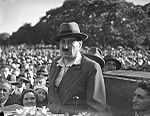Attempted exclusion of Egon Kisch from Australia: Difference between revisions
| Line 3: | Line 3: | ||
==The Raging Reporter from Prague== |
==The Raging Reporter from Prague== |
||
[[Image:1933-may-10-berlin-book-burning.JPG|150px|thumb|left|Egon Kisch's [[Nazi book burnings|books where banned and burnt]] by the [[Nazi]]s.]] |
[[Image:1933-may-10-berlin-book-burning.JPG|150px|thumb|left|Egon Kisch's [[Nazi book burnings|books where banned and burnt]] by the [[Nazi]]s.]] |
||
[[Image:Riksdagsbrannen.jpg|150px|thumb|right|Kisch was one of many Members of the [[Communist Party of Germany]] arrested following the [[Reichstag fire]]. He was detained in Spandau before being expelled from Germany.]] |
|||
Egon Kisch was a [[Jewish]] [[Communist]] and anti-war activist of [[Ethnic Germans|ethnic German]] (''[[Volksdeutsche]]'') origin born in [[Czechoslovakia]]. He had served in the [[Austro-Hungarian Army]] during [[World War I]] and was the author of many travel books. Kisch was a jurnalist and as the leading proponent of German Language [[Reportage|reportage]] became known to admirers and critics alike as The Raging Reporter from [[Prague]]. He was also a vocal critic of [[Adolf Hitler]]’s [[Nazi]] regime and as a result had his books banned and burnt in [[Nazi Germany|Germany]]. Following the Reichstag Fire, Kisch was detained in [[Spandau Prison|Spandau]] before he was expelled from Germany to his native Czechoslovakia. |
Egon Kisch was a [[Jewish]] [[Communist]] and anti-war activist of [[Ethnic Germans|ethnic German]] (''[[Volksdeutsche]]'') origin born in [[Czechoslovakia]]. He had served in the [[Austro-Hungarian Army]] during [[World War I]] and was the author of many travel books. Kisch was a jurnalist and as the leading proponent of German Language [[Reportage|reportage]] became known to admirers and critics alike as The Raging Reporter from [[Prague]]. He was also a vocal critic of [[Adolf Hitler]]’s [[Nazi]] regime and as a result had his books banned and burnt in [[Nazi Germany|Germany]]. Following the Reichstag Fire, Kisch was detained in [[Spandau Prison|Spandau]] before he was expelled from Germany to his native Czechoslovakia. |
||
Revision as of 11:54, 12 October 2008
In late 1934 and early 1935, the United Australia Party Government of Joseph Lyons spectacularly failed to exclude Egon Kisch from entering Australia.
The Raging Reporter from Prague

Egon Kisch was a Jewish Communist and anti-war activist of ethnic German (Volksdeutsche) origin born in Czechoslovakia. He had served in the Austro-Hungarian Army during World War I and was the author of many travel books. Kisch was a jurnalist and as the leading proponent of German Language reportage became known to admirers and critics alike as The Raging Reporter from Prague. He was also a vocal critic of Adolf Hitler’s Nazi regime and as a result had his books banned and burnt in Germany. Following the Reichstag Fire, Kisch was detained in Spandau before he was expelled from Germany to his native Czechoslovakia.
An Alias and an Informer

Victoria Police Commissioner and conservative apparatchik Sir Thomas Blamey learned from a police informant the World Committee Against War (a European Communist front organisation) was sending a Ewart Risch as a speaker to the All Australian Congress of the Movement Against War and Fascism held at the Port Melbourne Town Hall, Melbourne on 10-12 November 1934. When Blamey discoverd that Ewart Risch was Egon Kisch, known to Scotland Yard as a millitant Communist opponant of Adolf Hitler, he informed Thomas Paterson, the federal minister for the Interior who made a declaration of exclusion against Kisch under the Immigration Act.
Unwelcome


Kisch arrived in Fremantle on November 6th 1934 on the P&O liner RMS Strathaird. The ship was promptly boarded by representatives of the Federal Government who refused Kisch entry to Australia because he was 'undesirable as an inhabitant of, or visitor to, the Commonwealth'. Kisch was required to stay on board the Strathaird as it proceeded through Australian waters via Melbourne and Sydney.
Leap into History

On November 13th, Kisch defied Australian authorities when he jumped over 5 meters onto Melbourne’s Station Pier and broke his right leg. The Victoria Police quickly took charge of Kisch and carried him back on board the Strathaird. The next day the issue rose to national promince when Labor MP for Batman, Frank Brennan rose in the House of Representatives to accuse the Lyons government of cowardice. Why was Kisch’s right to speak in Australia being restricted just because the Lyons administration disagreed with him. In response Attorney-General Robert Menzies pointed out the every civilized country had the right to determine who should or should not be allowed in and that since Kisch was a revolutionary and that revolution involved violence he was not to be permitted entry.
Kisch's Legal Supporters Act


As the Strathaird made its way up the New South Wales south coast to Sydney, supporters of Kisch took his case before High Court Judge Evatt who found that the Federal Government had incorrectly excluded Kisch from Australia because they had failed to list the advice received from the British Government in their order. Evatt released Kisch and ordered that he be free to visit as long as he respected the laws of Australia.
The Government uses the Language Test
The Strathaird arrived in Sydney Harbour on 16 November 1934. The Federal Government now attempted to exclude Kisch using the Immigration Restriction Act. The Act allowed for a dictation test in any European Language for prospective immigrants and was usually the means to exclude non-whites from entering Australia under the unofficial White Australia Policy. Since Kisch was fluent in a number of European languages he was asked to dictate the Lord’s Prayer in Scottish Gaelic. Kisch refused to participate and was deemed to have failed the test and was taken into custody, this time by the New South Wales police, who released him on AU£200 bail.
A Litterary Reception
The Movement Against War and Fascism organized a Kisch reception committee including Katherine Susannah Prichard, E.J. Brady, Vance and Nettie Palmer and Louis Esson. This group formed the nucleus of what later became the Writers League drawing on the example of Egon Kisch’s own journalistic dedication to reportage. The reception committee organized concerts featuring performances from Greek, Italian, Yugoslav, Jewish, Russian and Aboriginal artists with the theme of international opposition to Fascism.
The High Court Rules


Kisch’s legal team was headed by Christian Jollie Smith who secured a writ of habeas corpus for Egon Kisch and briefed Albert Piddington and Maurice Blackburn who took his case to the full bench of the High Court which on 19 December 1934 ruled that he be free to visit Australia. Kisch’s legal team where able to demonstrate that the dictation test was administered unfairly. It was also found that Constable Mackay, who administered the test, although born in Scotland was not actually able to write the Lord’s Prayer in Scottish Gaelic. As a consequence Kisch had been asked to dictate a nonsensical sentence which Mackay could not correctly translate. The High Court ruled that Scottish Gaelic was not a European language within the meaning of the Immigration Restriction Act. Kisch was now free to visit and speak in Australia. Or so it seemed.
Prime Minister Lyons Intervenes

In January 1935 the Australian Prime Minister Joseph Lyons contacted the British Government and received the following written advice;
“Position is that Egon Kisch was refused leave to land in the United Kingdom in September 1933 on account of his known subversive activities stop permission to enter the United Kingdom would now not be granted to him stop Secretary of State for Dominion Affairs stop”
The government then made a second Immigration Act declaration, overcoming the technical shortcoming which Evatt had found in the first, and on 21 January 1935 the Central Sydney Police Court convicted Kisch of being a prohibited immigrant and sentence him to three months imprisonment with hard labour. However, Kisch was released on bail when his lawyer took an appeal to High Court Justice Evatt who again ruled that Kisch be set free. Evatt pointed out that under the law the minister had no power to rule on immigration matters after a person had entered Australia and he set up a hearing of the Full Bench of the High Court for March.
Kisch Free

Kisch was free to move about and speak. He became a popular figure addressing meetings, rallies and crowds waring of the dangers of the Nazi regime. On the 17 February 1935, he addressed an estimated 18,000-strong audience in Sydney's Domain:
“I have had three adventurous months since I last saw you Ö I know the Police Court, the Quarter Sessions Court, the High Court with one judge and the High Court with five judges. But whenever the court let me go I was arrested again. I have learnt to speak English better Ö Perhaps I do not speak King's English but it's Kisch English anyhow. I did not come here to tell there is terrorism in Europe. I come here to tell you how to stop it. I have been an eye-witness. I was arrested the day the Reichstag was burnt down by Göring and his lieutenants. I saw my friend, Erich Mühsam, the poet, whose works I translated, made to walk naked, even in winter, and to lick up the spittle of his captors. All his limbs were broken gradually, and he died.”
The Government does a deal
Facing the dilemma that further persecution and legal wrangling simply promoted Kisch’s cause the Lyons Government acted to cut its losses and offered to remit Kisch’s sentence, stop all legal proceedings and pay Kisch AU£450 for his costs in exchange for an agreed exit date of 11 March 1935. Having achieved notoriety above and beyond anyone’s expectations and public exposure of his warnings of Adolf Hitler and the dangers of fascism, Kisch accepted their offer and departed Sydney on the Orient Liner Ormonde bound for Marseille.
References
- Cochrane, Peter (2008). The big Jump: Egon Kisch in Australia. Commonwealth History Project: The National Centre for History Education.
- Rasmussen, Carolyn (2006). KISCH, EGON ERWIN (1885-1948). Australian Dictionary of Biography, Online Edition,: Australian National University.
{{cite book}}: CS1 maint: extra punctuation (link)
- Macintyre, Stewart (1998). The Reds: The Communist Party of Australia from Origins to Illegality. Allen & Unwin.
- Zogbaum, Heidi (2004). KISCH IN AUSTRALIA THE UNTOLD STORY. Scribe Publications.
